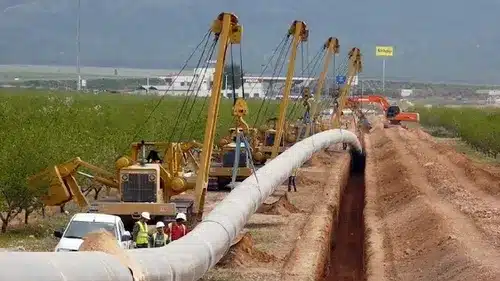The African Atlantic Gas Pipeline (AAGP) is a massive infrastructure project set to transform energy access across Africa and beyond. Designed to transport natural gas from Nigeria to Morocco, this 7,000-kilometer-long pipeline will pass through 13 West African nations, providing a reliable energy source and enhancing economic development. With an estimated cost of $26 billion, this project aims to boost regional integration while supplying gas to Europe.
Key Features of the Project
- Length: 7,000 km
- Countries Covered: Nigeria, Benin, Togo, Ghana, Côte d’Ivoire, Liberia, Sierra Leone, Guinea, Guinea-Bissau, Gambia, Senegal, Mauritania, Morocco
- Estimated Cost: $26 billion
- Gas Transport Capacity: Up to 40 billion cubic meters per year
- Target Market: Africa and Europe
Project Phases
Phase 1: Feasibility and Agreements (2016 – 2022)
- The project was first conceived in 2016 during a meeting between King Mohammed VI of Morocco and Nigerian President Muhammadu Buhari.
- Feasibility studies were carried out by Morocco’s Office National des Hydrocarbures et des Mines (ONHYM) and Nigeria’s National Petroleum Corporation (NNPC).
- In 2022, agreements were signed between multiple West African nations to support the pipeline’s development.
Phase 2: Engineering and Construction Planning (2023 – 2025)
- Engineering studies and environmental impact assessments were initiated.
- Several funding discussions took place with organizations like the African Development Bank (AfDB).
- Countries along the pipeline route signed agreements to participate in the project.
Phase 3: Construction and Implementation (2025 – 2030)
- The physical construction of the pipeline is expected to begin in 2025.
- Pipelines, compressor stations, and gas storage facilities will be installed across the 13 countries.
- Security and operational frameworks will be developed to protect the pipeline.
Phase 4: Operation and Expansion (2030 Onwards)
- The pipeline will be fully operational by 2030.
- Potential expansion into Europe through a connection to Spain is under discussion.
Economic and Energy Benefits
- Boosting Energy Security: The pipeline will reduce energy shortages in many West African countries, increasing access to clean and affordable gas.
- Job Creation: Thousands of direct and indirect jobs will be created during construction and maintenance.
- Strengthening Regional Integration: The project will promote trade cooperation and strengthen ties between the participating nations.
- European Gas Supply: Given Europe’s shift away from Russian gas, the AAGP could serve as a key alternative energy source.
Challenges and Potential Roadblocks
- Funding and Financial Risks: Securing the full $26 billion is still an ongoing process, with various financial institutions assessing the project.
- Geopolitical Tensions: Regional conflicts and competing pipeline projects (such as the Algeria-Nigeria Trans-Saharan Gas Pipeline) could impact progress.
- Environmental Concerns: Strict regulations will be required to minimize ecological impact and maintain sustainability.
The African Atlantic Gas Pipeline is poised to be one of the most transformative infrastructure projects in Africa’s history. With the potential to boost energy access, drive economic growth, and strengthen international trade, this project represents a new era for Africa’s energy independence. While challenges exist, successful implementation could position Africa as a global energy powerhouse.
